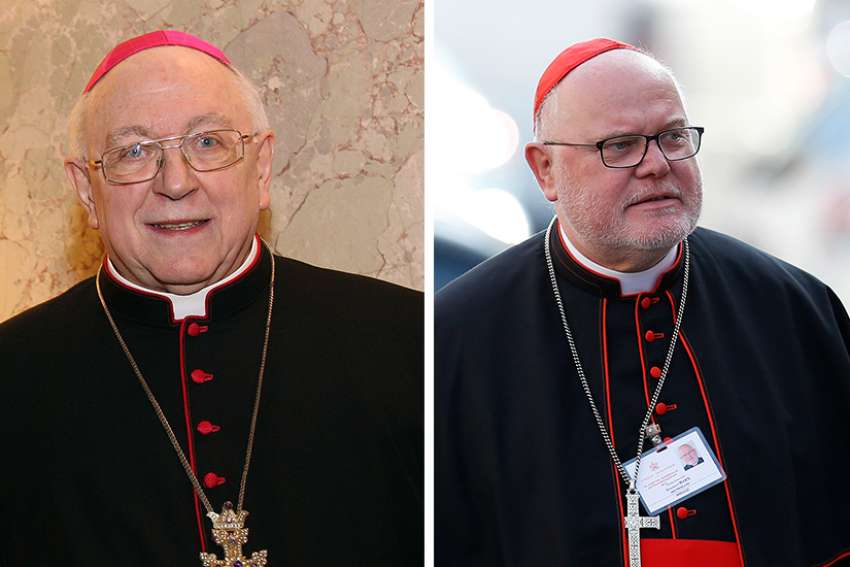Archbishop Peter Zurbriggen (left) lamented the common adherence to political correctness by those who oppose crosses at Bavarian state buildings. German Cardinal Reinhard Marx said that Austrian government had triggered "division, unrest and adversity" with the new government mandate.
Photos courtesy of Wikimedia Commons (left), Catholic News Service
Austrian nuncio laments Church opposition to crosses on Bavarian state buildings
By Catholic News Agency
VIENNA, Austria – The apostolic nuncio to Austria said Tuesday that he is “saddened and ashamed” that bishops and priests have been vocal critics of the Bavarian government's mandate to display crosses in government buildings.
“You know, as nuncio, as a representative of the Holy Father, I am saddened and ashamed, that when in a neighbouring country crosses are erected, it is bishops and priests of all people who think they have to criticize the decision. That is a disgrace! That is unacceptable,” Archbishop Peter Zurbriggen said May 1 at the Benedict XVI Philosophical-Theological University in Heiligenkreuz.
The nuncio, who is 74, lamented such religious and political correctness.
He noted that “We are in Heiligenkreuz,” which means in German “Holy Cross”. He was speaking at a “day of thanks” at the pontifical university, which is operated by Stift Heiligenkreuz, a Cistercian monastery located about 20 miles southwest of Vienna.
“Many know that my episcopal motto is 'Sancta Crux, mihi lux': Holy Cross, my light,” he added.
Archbishop Zurbriggen added that it is similarly shameful that some bishops have removed their pectoral crosses while visiting sites in the Holy Land.
“But then I think of… Cardinal Jean-Louis Tauran, who recently visited Saudi Arabia and was received by the king. He wore a cross that was twice as big as that cross which I am wearing now. That is good!”
Cardinal Tauran, president of the Pontifical Council for Interreligious Dialogue, had met with King Salman in Riyadh April 18.
Archbishop Zurbriggen's comments come after Cardinal Reinhard Marx of Munich and Freising criticized the Bavarian government's move, saying the cross is “a sign of opposition to violence, injustice, sin and death, but not a sign [of exclusion] against other people.” The cross can be misunderstood as purely a cultural symbol, he said, and thus misused by the state.
Cardinal Marx said the Bavarian government had triggered “division, unrest and adversity”.
But Bishop Rudolf Voderholzer of Regensburg had applauded the government's decision, saying that “the cross is the epitome of Western culture. It is the expression of a culture of love, compassion and affirmation of life. It belongs to the foundations of Europe.” Its public presence – which in traditionally Catholic Bavaria is near ubiquitous – should be seen as such, welcomed, and appreciated, he said.
This is the reason, Bishop Voderholzer said, Christians have placed crosses atop the peaks of Bavarian mountains: “Not the national flag or other symbols of human rule, as others might have liked to see at other times, but the cross. It should be widely visible, the cross, the sign of salvation and life in which Christ is heaven and earth, God and reconciled people, victims and perpetrators.”
The requirement that every entrance to state buildings display up a cross was announced by the office of Markus Söder, Bavaria’s premier. The directive to hang the crosses by June 1 has sparked a public debate in Germany, tapping into deeper angst about culture, values, and Christian roots in a country divided by questions of heritage, religion, and identity.
The accusation that the government would attempt to misappropriate the cross or designate it as a purely cultural symbol was flatly rejected by Söder, a Lutheran who hails from the Protestant region of Franconia in northern Bavaria.
“Of course the cross is primarily a religious symbol,” Söder told German media. However, the premier continued, the cross, in the wider sense, also carries with it basic foundations of a secular state.
Making the announcement April 24, Söder's office had said the decision is meant to “express the historical and cultural character of Bavaria” and to present “a visible commitment to the core values of the legal and social order in Bavaria and Germany.”
Please support The Catholic Register
Unlike many media companies, The Catholic Register has never charged readers for access to the news and information on our website. We want to keep our award-winning journalism as widely available as possible. But we need your help.
For more than 125 years, The Register has been a trusted source of faith-based journalism. By making even a small donation you help ensure our future as an important voice in the Catholic Church. If you support the mission of Catholic journalism, please donate today. Thank you.
DONATE

